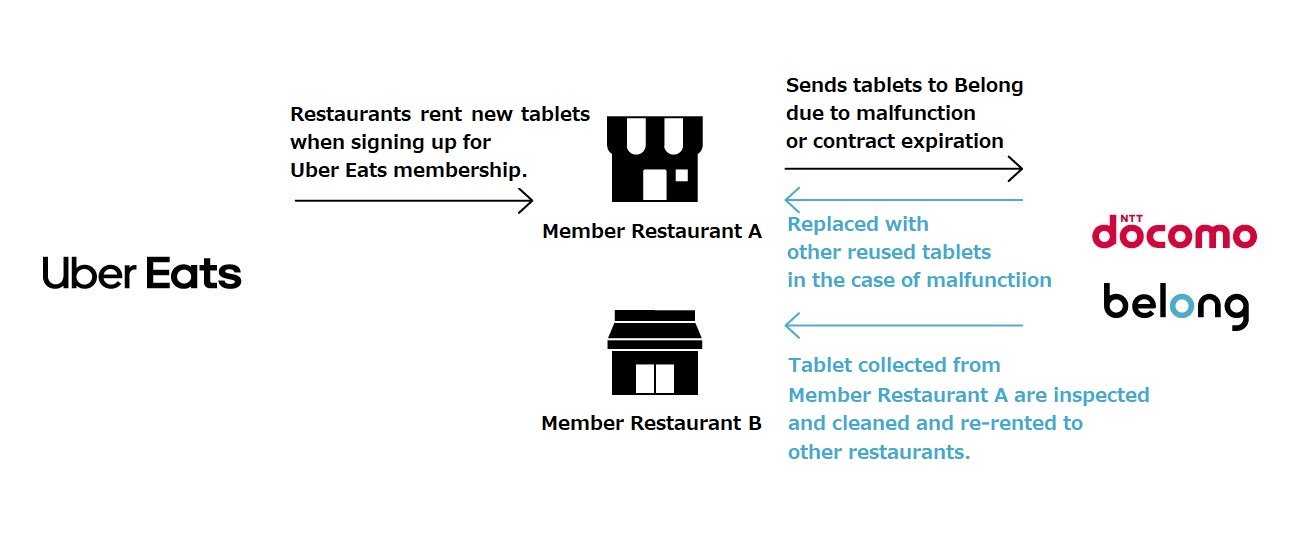ITOCHU Announces a New Business of Collecting and Reusing Used Tablets Targeting Food Delivery Member Stores Across Japan
June 28, 2022
ITOCHU Corporation (headquartered in Minato-ku, Tokyo; Keita Ishii, President & COO; hereinafter “ITOCHU”) announced today that it has started a business of collecting and reusing tablets targeting member stores in a food delivery business, Uber Eats, through a wholly owned subsidiary (including indirect ownership) of ITOCHU, Belong Inc. (headquartered in Shibuya-ku, Tokyo; Daisuke Inoue, President; hereinafter “Belong”) operating an online business of distributing used mobile phones, in cooperation with NTT Docomo, Inc. (headquartered in Chiyoda-ku, Tokyo; Motoyuki Ii, President and Chief Executive Officer; hereinafter "Docomo") and Uber Eats Japan LLC (headquartered in Minato-ku, Tokyo; Yukiko Muto, President; hereinafter, "Uber Eats").
Demand for the use of smartphones and tablets is growing in all aspects of the "new normal era" in response, for instance, to the increasingly common practice of telecommuting as a result of the COVID-19 pandemic and an increase in in-store POS terminals, monitors in taxies, and gig workers. While the number of companies purchasing new devices is on the rise, global shortages of semiconductors prevent companies from securing a sufficient supply of smartphones and tablets, which is beginning to affect the businesses of companies implementing digital transformation based on digital devices. The Russian invasion of Ukraine has added to concerns of prolonged shortages of semiconductors and sharply rising prices of raw materials. In the food delivery industry, too, the number of restaurants mainly operating a delivery business and stores starting the delivery of food, commodities, and other products are rapidly increasing alongside conventional restaurants, partly due to the impact of the COVID-19 pandemic. As a result, demand for tablets to receive orders from end-consumers is fast growing.
In cooperation with Docomo and Uber Eats, ITOCHU and Belong launched a business of collecting and reusing tablets targeting approximately 150,000 restaurants registered with Uber Eats.
More specifically, Docomo and Belong collect tablets distributed by Uber Eats to its member restaurants when they malfunction or their contracts expire. The collected devices are inspected and screened at one of Japan’s largest used device operation centers run by Belong. Reusable tablets are redistributed to other members of Uber Eats. Unusable devices are purchased by Belong and redistributed through the domestic and overseas distribution networks of ITOCHU. A demonstration experiment for this project started in December 2021 and has achieved collection, reuse, and distribution among thousands of restaurants to date. ITOCHU is now launching the project on a full scale.
This project is enabling a reduction of approximately 27% in the number of new tablets that previously needed to be purchased by Uber Eats. In addition, the project achieves a stable supply of tablets to member restaurants without being affected by the shortage of smartphones and tablets caused by semiconductor shortages.
The use of used smartphones in lieu of new products has the effect of reducing GHG emissions by approximately 42%. An equivalent effect is expected from tablets, and ITOCHU will contribute to the attainment of SDGs by reducing the use of new tablets and promoting the reuse of devices through these activities.*1
ITOCHU’s targets laid out in the basic policy of its medium-term management plan are realizing business transformation by shifting to a market-oriented perspective and enhancing our contribution to and engagement with the SDGs through business activities. Uber Eats has more than 150,000 registered restaurants, with a huge range in genres. It offers delivery services with the reuse of tablets, reducing the environmental impact, in addition to efficiently distributing tablets to restaurants.
Through the reuse of used mobile phones and tablets, ITOCHU will continue to expand its services and provide full support from the customer's perspective, with the aim of helping develop a sustainable society through the effective use of limited resources.
- *1Calculated based on LCA analysis by the Sustainable Management Promotion Organization (SuMPO). Comparison of the GHG emissions of two new iPhone 11s used for two years each and one new iPhone 11 unit used for two years and then reused for two years after collection, inspection, and resale.
- *This project will be conducted by NTT Communications Corporation from July 2022 due to the integration of the corporate customer business of Docomo into NTT Communications in July 2022.
|
|

